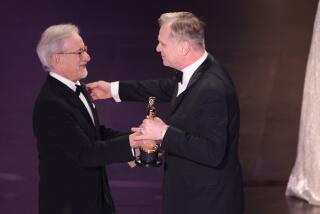2018 Herb Alpert Award winners noted for explorations of race and social justice
For five midcareer pros working in film/video, dance, music, theater and visual art, the Herb Alpert Award in the Arts is a remarkable prize: $75,000 to use at a time when work is often poised to go in exciting or even radical new directions.
The Herb Alpert Foundation on Thursday announced the winners for 2018, the 24th year the awards, which are administered by California Institute of the Arts, have been handed out. The winners are choreographer Okwui Okpokwasili, filmmaker Arthur Jafa, composer and pianist Courtney Bryan, playwright Robert O’Hara and interdisciplinary artist Michael Rakowitz.
Okpokwasili creates politically engaged work often based on social-justice issues, including the Nigerian Women’s War of 1929 and the Boko Haram kidnappings of hundreds of young girls. She is a Hodder Fellow at Princeton University.
The awards panel recognized “her profound, generous and risk-taking work, and for the powerful way she poetically investigates and embodies joy, grief, desire and the landscape of a woman of color with integrity, artistic intelligence and physical truth.”
Jafa creates bold films and room-size installations that consider the question of race in society. As a cinematographer he has worked on films by Spike Lee (“Crooklyn”), Isaac Julien and John Akomfrah. Jafa’s work has been exhibited at the Hammer Museum in L.A., the Metropolitan Museum of Art in New York and the Serpentine Gallery in London, among others.
Of Jafa, the panel wrote: “His astute, at times crushing, juxtaposition of images and ideas, coupled with lyrical and syncopated editing embodies a grace and resilience that boldly confronts conditions of extremity and terror with hope.”
Bryan works in jazz, traditional gospel, spirituals and hymns and is known for her gifted improvisational techniques. She is a professor at Tulane University.
The panel wrote that she was chosen “for her impressive, deeply thought out, new cosmopolitan classical music imbued with fierce urgency of the moment as well as for her commitment to spirit and social justice, to shifting power dynamics and deep understanding of the effects of the human voice.”
O’Hara’s plays include “Insurrection: Holding History” and “Bootycandy.” Times theater critic Charles McNulty reviewed a 2015 Celebration Theatre production of the latter, writing that “O’Hara’s play is all the more powerful for being so fearlessly unpredictable.” In a 2016 review of O’Hara’s “Barbecue” at the Geffen Playhouse, McNulty wrote, “He’s a lampoonist with a trenchant take on American culture and a gift for ferociously satiric one-liners.”
The Alpert panel wrote that it was taken in by O’Hara’s “ferocious, funny, fearless, spiky, provocative work, his powerful, mature voice, formal chops, radical thinking and incredible rhythmic ear.”
Rakowitz works in sculpture, radio, video, performance and architecture to create thought-provoking installations, including a long-term project to re-create more than 850 artifacts looted from the National Museum of Iraq.
“Artist Michael Rakowitz was named the Visual Arts prizewinner for his bold and daring, deeply researched, deeply human work,” the panel said. “Unearthing hidden histories, he makes art that speaks to a broad scope of social, political and economic issues which potently reflect our present moment, and create bridges across time and cultures.”
The awards ceremony will be held Friday during a lunch at the Herb Alpert Foundation in Santa Monica.
ALSO:
2017: Why the political moment makes Herb Alpert Awards so relevant
Herb Alpert Foundation to donate $10.1 million to L.A. Community College
More to Read
The biggest entertainment stories
Get our big stories about Hollywood, film, television, music, arts, culture and more right in your inbox as soon as they publish.
You may occasionally receive promotional content from the Los Angeles Times.











